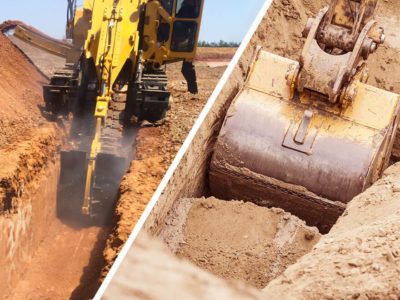If you’re doing any large-diameter installation work, you likely own at least one excavator. And since they are already in your fleet, they are probably your go-to equipment solution for every trenching project you do. But, just because an excavator is there doesn’t make it the right machine for large-diameter trenching. A trencher is a more efficient and productive solution on some projects and in certain ground conditions. We’re not talking about a pedestrian trencher or a utility trencher used more for installing fiber, cable, irrigation and electrical lines. Large-diameter takes a large trencher on tracks with carbide teeth designed for cutting rock. On many jobs, just one of these types of trenchers can outperform as many as four excavators.
Sounds pretty good, doesn’t it?
Keep reading to learn about:
- The role of a trencher
- How to determine the appropriate size trencher for your needs
- When to buy and when to rent a trencher
The role of a trencher
It’s important to identify the trencher’s role on the jobsite. Will it be replacing excavators that had previously done the trenching work? Find out how the trencher will fit with existing equipment and the efficiencies gained by adding it to a jobsite machinery lineup.
According to Vermeer Applications Specialist Gregg Van Roekel, many contractors think they understand how trenchers work, and their productivity in open-cut applications, but have concerns about investing in this dedicated machine. “When I meet with contractors, I explain that a trencher can complement existing machines, and they can get more out of their other equipment with the addition of a trencher. It’s easier to see the value in taking it to a jobsite. We’re not here to replace a fleet of other equipment. We’re here to help make it better.”
Sizing a trencher
Determining the right-sized trencher is dependent on the type of ground conditions the machine be working in. Smaller, lower-horsepower machines are efficient in soft soils, but as the relative hardness of the ground increases, so do the demands on the machine. Trenching harder rock requires more weight and horsepower, and the right trencher will handle the application better.
“If you’re trenching with nice, black dirt in the Midwest, you don’t need as much power. If you’re working in south Texas where it’s solid rock, the conditions will be harder on the machine,” said Van Roekel. “You need to get the right-sized machine so that it can perform in the application and optimize production.”
But, with power comes size. Higher-horsepower trenchers are larger in size. Often they’re so much bigger, the process of moving them from job to job can inhibit operators from adding new work because of the time and cost of moving the machines. That makes it important to balance the size of the trencher’s performance with its physical size.
“Some operators want a big machine, but they want to be able to haul it around conveniently,” Van Roekel said. “You can’t really load a 260,000-pound (117,934 kg) machine at a jobsite in one truckload.”
Buying versus renting
Before employing a trencher on your next project, you also need to determine whether buying a unit or renting is the right fleet-management decision. If future projects lead you to believe that you’ll be able to keep a trencher busy consistently, outright ownership likely makes economic sense. On the other hand, if you think you will only need a trencher more sporadically or only on select jobs, renting may be a more practical strategy, Van Roekel said.
“Large corporations or those that specialize in trench-installation work are more apt to buy a trencher,” he said. “Typically, general contractors who don’t have a trencher but need one for a job will be more likely to rent from a dealer and turn it back in when the job is done.”
More research
If you’re still on the fence about whether you should consider using a trencher for your next large-diameter project, visit The Trencher Effect site to learn about all the other benefits a dedicated trencher can deliver on your next trenching job. And, if you would prefer to talk to someone on the phone or in person, contact your local Vermeer dealer. They can help you determine if a trencher is right for your specific needs.
You can also learn more about the Vermeer trencher lineup here.
Vermeer Corporation reserves the right to make changes in engineering, design and specifications; add improvements; or discontinue manufacturing at any time without notice or obligation. Equipment shown is for illustrative purposes only and may display optional accessories or components specific to their global region. Please contact your local Vermeer dealer for more information on machine specifications.
Vermeer, the and Vermeer logo are trademarks of Vermeer Manufacturing Company in the U.S. and/or other countries.© 2022 Vermeer Corporation. All Rights Reserved.
